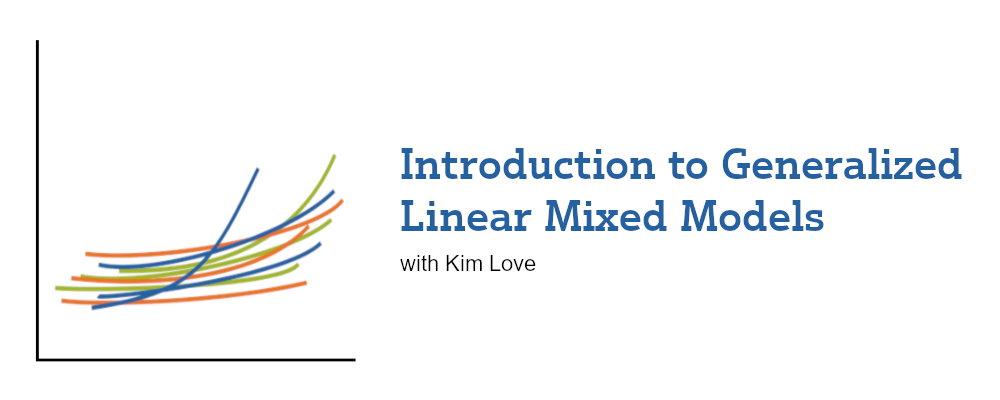
GLMM is a set of powerful and versatile models that allow data analysts to deal with scenarios that other models cannot. You need a GLMM if:
- You have data that aren’t independent because observations are clustered. For example, your data includes outcome measurements taken on the same subject over time (repeated measures).
and
- Your outcome variable has some distribution that doesn’t result in normally distributed errors. For example, your outcome could be measured in counts, proportions, or categories, or your data simply doesn’t adhere to a normal distribution.
- When you assume variables are independent when they’re not, and/or you try to fit non-normal data to a normal distribution, things get… well, a bit screwy. P-Values will be wrong. Standard errors will be incorrect. And your statistics will be biased.
This is where GLMM comes in. It gives us the ability to make different, more flexible assumptions.
I’m Kim Love, workshop instructor.
By the end of this workshop, my goal is for you to understand, at a high level, what is actually happening when you run a GLMM. You will be able to implement a GLMM using your own software and have confidence in your results.
 Kim Love, PhD
Kim Love, PhD
In this eight-module, online workshop, we’ll cover:
- The types of designs, research questions, and outcome variables that require GLMMs
- How to set up a model and assess fit for generalized linear mixed models
- The actual steps, considerations, assumptions, and interpretations for the most common types of GLMMs:
- Poisson and negative binomial for count data
- Logistic regression for binary, ordinal, and multinomial categorical data
- How to actually run GLMMs in four types of software and how to deal with tricky data situations
Who Is This Workshop For?
This workshop is suitable for students and professionals.
This workshop is for you if you:
- Are an intermediate user of statistics
- Are comfortable with linear mixed models
- Are comfortable with some form of generalized linear modeling (e.g. logistic regression, count models, etc.)
- Are a researcher or applied statistician, not a theoretical statistician. You are interested in learning how to understand, apply, and interpret GLMMs, not derive them or understand their theory.
- Have attempted learning GLMM on your own and get stuck with all the formula and jargon and just don’t see how all that applies to your analysis.
It is NOT for you if you:
- Are already familiar with and feel very comfortable running and evaluating GLMMs (It is meant to be introductory for those who have the pre-requisites).
- Don’t already have a good handle on logistic or Poisson regression. We will review these but it will go too fast if this is new.
- Don’t already have a good handle on fitting mixed models. We will review these but it will go too fast if you’re still unsure of what random effects are or how to use them.
“The instructor provided excellent narrated videos explaining the code and the models being fit to the data. She also did a great job of answering a range of questions. No matter whether the question was about a basic concept or a highly nuanced, mathematical detail, she treated all students with respect.”
— Lise DeShea, Previous workshop participant —
How Does It Work?
This course is an 8-module online workshop.
All lessons and software demonstrations are pre-recorded. Each week, we’ll make a new module available. At your convenience, watch the video lessons, watch the video software demonstrations, do the exercises, and review the software syntax of your choice to implement the examples in the lessons.
Have questions? No problem!
Once every week during the workshop, you’ll meet with your instructor for a live webinar-based Q&A session where you can get assistance with workshop concepts, deepen your knowledge, and clarify any questions. If you can not attend Q&As, direct support from the instructor is available on the workshop forum.
All 8 Q&A Sessions Are Recorded for Your Convenience.
Where Do I Access Recordings and Material?
For each of the eight modules, you will have a set of training resources and material.
As a participant of the Introduction to Generalized Linear Mixed Models workshop, you can access these for 12 months in our participant-only website.
 Data Sets
Data Sets
Real research data sets in SPSS, R, Stata, and SAS formats.
 Exercises + Solutions
Exercises + Solutions
Try out what you’ve learned in each module to cement the material. Never get stuck with provided syntax and interpretations.
 Software Syntax and Demo Videos
Software Syntax and Demo Videos
Step-by-step videos for SPSS, R, Stata, and SAS. Syntax files available to download so you can save and edit them for your own analysis.
 Forum Access
Forum Access
Ask your instructor about workshop content or how to apply it to your own data analysis.
 Handouts
Handouts
Session slides and supplementary material to support your learning.
 Q&A Recordings
Q&A Recordings
Can’t make a live Q&A? Submit questions ahead of time and get answers from the recording.
 Lessons
Lessons
Each week’s new lesson is a recorded video so you can watch at your preferred schedule.
 Suggested Resources
Suggested Resources
External videos, articles, or exercises that we recommend to support your learning.
You’ll have access to this site and all the related materials and resources for ONE FULL YEAR. That means you can re-watch sessions and ask additional questions again during that 12-month period.
Often, our students report they understand the material at a deeper level on a second or third pass. You’ll learn more every time, so take advantage of it!
“I learned a great deal in this workshop. I initially hesitated about taking the workshop because I thought that if I am familiar with linear mixed modelling (LMM) and generalized linear models (GLM), then I should be good to go with generalized linear mixed modelling (GLMM). But I found that there are a lot of nuances and pieces of knowledge that are unique to GLMM and Kim teaches those in an effective way.”
— Shamel Addas, Previous workshop participant —
What’s Covered in the Workshop?
Module 1: Conceptual Review
- Linear Mixed Models
- Generalized Linear Models (not mixed)
- Connections to GLMM
Module 2: Overview of Generalized Linear Mixed Models Data
- GLMM Data
- Gaussian Data and GLMM
- Displaying GLMM Data
Module 3: Poisson and Negative Binomial Models for Count Data
- Model Assumptions
- Model Building
- Model Interpretation
Module 4: Logistic Models for Binary Data
- Random Intercept and Slopes
- Model Assumptions
- Model Building
Module 5: Ordinal Models for Ordered Categorical Data
- Random Intercept and Slopes
- Model Assumptions
- Model Building
Module 6: Generalized Logit Models for Multinomial Data
- Random Intercept and Slopes
- Model Assumptions
- Model Building
Module 7: Correlated Errors
- Review: Repeated Measures in LMM
- Repeated Measures in GLMM
Module 8: Further Topics
- Missing Values
- Power and Sample Size
Dates and Times
Workshop Orientation:
Tuesday, October 17, 2023 from 3pm – 3:30pm (GMT-5)
Module Release Dates: Wednesdays
Q&A Session Dates: Tuesdays, 3pm – 4pm (GMT-5)
Also, you have access to all the workshop materials for a full 12 months from your enrollment date.
Sorry, enrollment for this workshop is not currently open.
Please contact us if you have any questions
or get on the waiting list to be notified when it's open again.
About Your Instructor
Hi, I’m Kim Love, Ph.D., your workshop instructor and owner of and lead consultant at K.R. Love Quantitative Consulting and Collaboration.
I have worked as a statistical consultant and collaborator in multiple professional roles, most recently as the associate director of the University of Georgia Statistical Consulting Center.
I have more than a decade of professional and academic experience in the fields of regression and linear models, categorical data, generalized linear models, mixed effects models, nonlinear models, repeated measures, and experimental design. I have a B.A. in mathematics from the University of Virginia, and an M.S. and Ph.D. in statistics from Virginia Tech.
While I enjoy working with all my clients, I particularly enjoy working with those who feel they have a less-than-perfect relationship with statistics.
My goal is to spread an appreciation of statistics across many fields of study, starting by making it understandable to those who interact with it.
 Kim Love, PhD
Kim Love, PhD
“Kim Love demonstrates a mastery of the subject, which she covers with warmth and a clear desire to ensure everyone understands each step…”
— John Williams, Previous workshop participant —
Prerequisites
So what kind of background in statistics do you need?
This workshop is an advanced level workshop.
You will need to have a solid foundation in linear mixed models and logistic regression or count models.
If you have questions about whether you’re ready for this class, just email us. We’ll give you our honest opinion. We want you to succeed!
Your Satisfaction Is Guaranteed
As with all of our programs, your satisfaction is guaranteed. Your registration fee is fully refundable for any reason up to the close of enrollment, no questions asked. Once the refund period ends and the workshop begins, we want you to be satisfied. If you participate fully in a workshop – watch, read, and try out what is included – and find you are not satisfied, we will give you a full refund. Just notify us within 90 days of purchasing the program.
FAQs
Q: I haven’t taken a statistics course in years. Will I be able to keep up?
A: As long as you have the suggested prerequisites (a strong understanding of linear mixed models and logistic regression or count models), you should be fine.
However, you WILL need to spend some time each week, both going over the material and also “getting your hands dirty” with some data. Expect to spend 4-5 hours per week reviewing the material and doing the exercises, and re-running class examples on your own.
And if you have questions during the workshop, make sure to attend the Q&A sessions or post in the workshop forum to clarify anything you’re not clear on.
You know how this goes: The more time you put in, the deeper your understanding.
Q: What’s your refund policy?
A: As with all of our programs, your satisfaction is guaranteed. Your registration fee is fully refundable for any reason up to the close of enrollment, no questions asked. Once the refund period ends and the workshop begins, we want you to be satisfied. If you participate fully in a workshop – watch, read, and try out what is included – and find you are not satisfied, we will give you a full refund. Just notify us within 90 days of purchasing the program.
Q: Do you offer student discounts?
A: Yes, we do! Current students with a valid ID can register for up to 30% off the standard rate. Click here to receive our student discount on all our workshops: Student Discount List
Q: Things are very busy at work right now, and I’m afraid I won’t have time to keep up. How much time per week does this really take?
A: We’ve worked hard to make sure people can take a workshop in the midst of their normal work life. For longer workshops, we build in break weeks during the course.
Each workshop lesson is 1.5 – 2 hours.
Each week, we have a one-hour Q&A session. You don’t have to attend, we just make those available so you can have any questions answered or listen in on others’ questions.
We provide exercises, answers and data sets, so you can practice what you’ve learned each week and get help in the Q&As. These will take you a few hours each week, maybe up to 3 or so. The exercises aren’t required—you’re not graded. But we’ve gotten feedback that they’re very helpful, as it allows you to practice and figure out what you did and didn’t understand.
In other words, each week, there are approximately 2 hours of instruction, one hour of Q&A, and about 2-3 hours of practice time. So if you have a crazy hectic week during the workshop, you have catch up time. But If you have a crazy hectic month, you may be better off waiting as you won’t really have a chance to catch up.
One reminder: You have access to the workshop website, all materials, and a place to ask questions for a year. So if you get behind, you aren’t missing out. You can catch up on your schedule.
Q: I teach/work/sleep during this time and cannot attend live. Is there any way to register and access the webinar sessions later?
A: Yes! We have participants from many time zones with many different work schedules. In order to support our diverse student base, all Q&A sessions are recorded and made available to students within 48 hours. They’re screenshot video files, so you’ll hear the instructor talking and see their screen, just as live participants do. You can even submit questions for written answers any time between sessions. Many students take the entire workshop in this manner, never attending a session live.
You can also download and keep these videos forever, so if you need to refresh your memory at any point in the future, it’s yours to review.
Q: I’m outside the U.S. Can I still participate?
A: Yes. We have participants in our workshops from many different countries. You will want a fast internet connection and either a computer speaker or a telephone if you plan to attend live.
Q: Can I pay with Paypal?
A: Yes. When you check out, you can pay directly using our system or paying with Paypal. However, the three-payment option is not available using PayPal.
Q: Can I join the Q&A webinars from my tablet or phone?
A: Yes. You can join all webinar sessions from your Apple or Android device by downloading a free Zoom app.
Q: This really isn’t a good time for me. Will you be offering this workshop again soon?
A: We don’t have a set schedule for running each workshop. We try to schedule each workshop every 18 months, though very popular workshops may be offered more often. We are sometimes unable to re-run a workshop if the instructor becomes unavailable so there are no guarantees that any workshop will be run again.
If you think you’ll need the material in the next half-year or so, I would suggest registering now. You’ll get all the materials to download and review at your convenience, and you can attend again for free any time in the next 12 months.
Have additional questions? We’re here to help! Just email us at support@theanalysisfactor.com.
